Some kind of revolution
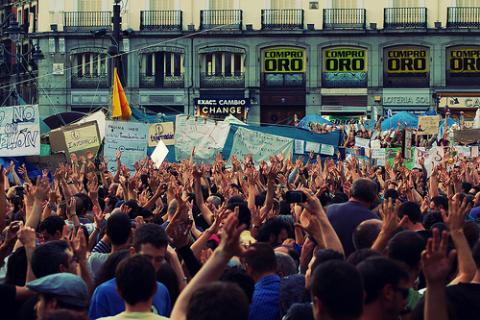
In Puerta del Sol, the camp’s peaceful and serious ethos seems to have won the demonstrators the respect of many older members of the Madrid community. Can it have a lasting impact across the country? By Ryan Gallagher.
On the evening of May 15, a small group of Spanish protesters demonstrated in the capital city Madrid against high unemployment and austerity measures across the country. Marching towards the city’s main square, Puerta del Sol, a number of the protesters were involved in a conflict with police officers who tried to prevent them from entering. 24 were arrested and taken to Madrid’s largest police station, where they were interrogated by members of a specialist police información unit and held for 48 hours.
While the activists were in custody, their friends continued to protest at Puerta del Sol, refusing to leave. They felt the arrests had been unjustified, and claimed the police had used heavy-handed tactics that sparked the initial conflict. They posted videos on the internet of the police allegedly 'ambushing' protesters from behind, and used social networks to encourage others to join them in the square.
Before long, the numbers were snowballing at an astonishing rate. Taking inspiration from the uprisings across the Arab world, within a matter of days tens of thousands were in Puerta del Sol. But the demonstration was no longer just about the arrest of the protesters – it was about unemployment, political corruption, the Spanish government’s multi-million euro bailout of banks at the height of the economic crisis.
Dubbed 15-M by the Spanish media (named after May 15, the first day of the protests), the activists built makeshift tents with tarpaulin and wood, divided themselves up into various working committees, and started drafting proposals for change.
Puerta del Sol continues to be occupied by thousands of protesters, some of whom say they will stay indefinitely. Below is a detailed account of the structure, organisation, ethos and goals of the camp, featuring insight from some of those behind the movement…
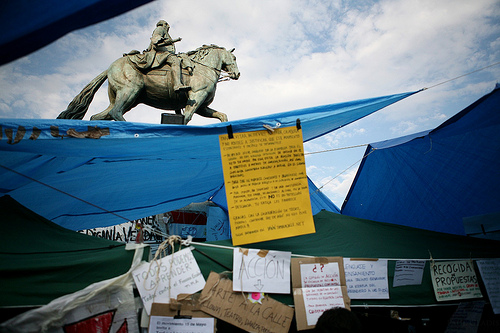
Inside the camp
The camp at Puerta del Sol functions like a micro-society. Food and water is provided for free, donated by sympathetic local businesses; there are fully functioning kitchens; toilets; a media and communications tent; a children’s nursery; and even a library.
It is divided up into six key working committees, each tasked with a specific area: politics, economics, education and culture, social policy and migration, environment, and health. Every committee has a ballot box outside, into which people are encouraged to deposit suggestions for change. Every suggestion is looked at and discussed, with conclusions taken forward to a meeting with heads of each respective committee. After more long and gruelling discussion, the conclusions are then eventually brought before a general assembly – during which the entire camp (or anyone else for that matter) is able to vote on each commission’s suggested proposals.
There is no distinct leader or figurehead; all decisions are made by consensus, meaning every single person has to be in agreement. If one person does not agree, the group will simply keep discussing until they form a compromise and are able to move forward. The meetings often take hours, with the activists working through the night, debating, discussing and pouring over the hundreds – perhaps thousands – of suggestions they receive daily through the ballot boxes.
“The leadership is our assembly, where the decisions are taken by consensus,” said one of the activists, Juan, 22. “Many people think that this doesn’t work – the reality is we are where we are because of this consensus.”
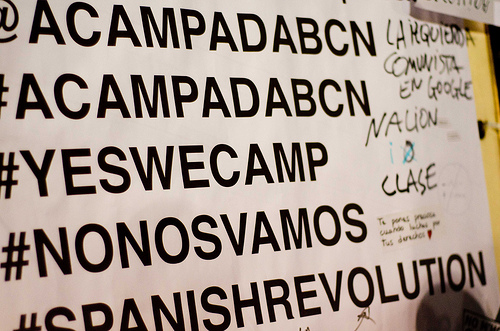
Ethos
A key element to the success and growth of the camp seems to have stemmed from its rigorous organisation and serious ethos. The media-savvy organisers are keen to discourage alcohol consumption in the square, because they feel it could be used to negatively portray them as irresponsible young people, just looking for a good time and an excuse to get drunk and party.
In order to counter any negative perceptions, they keep the square meticulously clean and actively encourage pacifism and non-violence. Volunteers sweep the area almost constantly and remarkably most people adhere to the no-alcohol rule – at least until well after dark.
While most of the key activists in the square are young – between around 20-35 – there are also many older people spending time at the camp. Its rigorous organisation and serious ethos seems to have won the demonstrators the respect of many older members of the Madrid community.
One 66-year-old man, Manuel Ferreira, described how the scene reminded him of Paris in 1968 – though he said it was “more peaceful” due to less conflict with the authorities. Ferreira also said he believed the Madrid protests were of greater historical significance, something he attributed to the way internet technology today can propagate movements and make them global within such a short space of time. “I think I am living a new world order,” he said. “I am sure it will spread.”
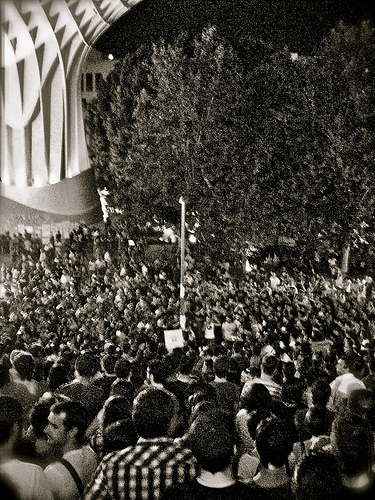
Policing
The peaceful nature of the camp must to some degree be attributed to the police’s response, for they stay behind barriers to one side of the square. So long as Puerta del Sol is full of families, children and older people, the activists believe the authorities will be likely to stay away. Only a few days after the protests began, the police tried to block off the square – but this only encouraged more demonstrators to come out into the streets. As such, the authorities appear to have realised that their presence within the camp only antagonises protesters, and so have been forced to simply let them get on with it.
“They saw that they could not control this with police,” said Beatriz Pérez, a 29-year-old spokesperson for the movement. “So I think they took the opposite strategy: to let the movement be pacifistic, because we are a pacifistic, non-violent movement. They cannot move us out, so the police have no duty here.”

Political leanings
One of the most striking things about the camp at Puerta del Sol, aside from the size and scale of it, is the diverse array of political perspectives represented. There are people within the camp who would class themselves as radicals – anarchists, socialists and anti-capitalists – but the movement itself appears to be much broader. At its core, it is pro-democracy, united by a collective disdain for the current state of things. It is not driven by a desire to demolish the current political and economic system; rather, it aspires only to change and reform it. “We are not against the system,” said Juan. “We want to change the system – so that the people can be better represented.”
(There is no doubt that many within the movement want to see a shift away from the capitalist economic model, but that is something they do not want to talk about at this stage. They feel that they have to take one step at a time – and, for now, they simply want their voices to be heard.)
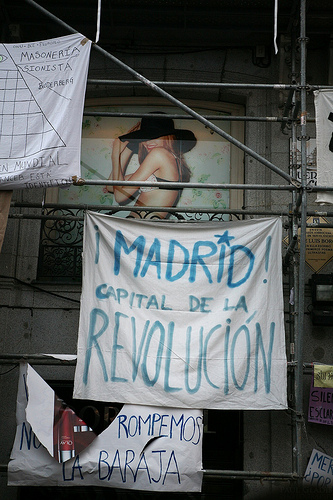
Goals and demands
The movement’s central demands are fairly modest. They want to have a referendum on electoral reform, and call for the dissolution of the Spanish parliament’s second chamber, which they believe is a waste of time and money. They also want to see an end to a policy of ‘salaries for life’ for Spanish politicians, and demand greater media freedom. The media in Spain, they say, is too heavily influenced by the political and religious right, with ownership of the most powerful broadcasters and newspapers concentrated in the hands of a few. The movement also believes that there is a major problem with corrupt politicians, and have produced a list of those they claim should be investigated for taking money in return for favours (in some cases, allegedly, from large Spanish corporations).
A key aim is simply to make the current system more representative. They feel that neither of Spain’s two main political parties – the Socialist Party or the Partido Popular (People's Party) – can offer that substantive change that is required. This feeling was summed up on Sunday, 22 May, on the eve of local elections across the country – as people at the camp simply did not care about the outcome.
“In the end, no matter the colour of the party, they all end up doing exactly the same thing,” said Raul Bartolome, 38. “If you listen to politics here, all the time they are just yelling at each other about doing nothing at all and, in the end, they just keep on doing whatever they want to – no matter what you vote them in for.”
But in spite of the bleak cynicism about the current political system, people at the camp are intensely optimistic about the future. They believe that their model of organisation could spread across Spain and beyond, and the prospect of it happening does not look like a mere pipe dream. At the time of writing, in more than 60 Spanish cities there were similar protests taking place, with few of them showing signs that they were about to lose any steam.
Many of the demonstrators think this is the start of something that could even be global. When speaking to them you can sense their hope and see it in their eyes; there is an energy around the camp that almost defies description. They feel that they are part of some kind of epochal shift from something old to something new – and none of them is willing to let the prospect of change slip from their grasp. “We want to do the same thing in every neighbourhood in Madrid and across Spain,” said Bartolome. “I really think we’re living some kind of revolution.”
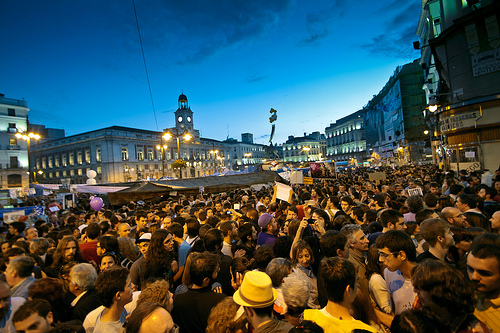
Prospects and staying power
For the organisers at Puerta del Sol, occupation of the square represents only the first step in what they foresee as a long and probably gruelling political battle. Given the degree to which the movement in Spain has taken off over the course of the last two weeks, it theoretically carries enough weight to transform Spanish politics. The crucial factor is whether the protesters will be able to maintain the momentum that has carried them this far. By forging formal organisational links with other groups across the country they will carry substantial clout, and the more unified they are the more likely they will be to force the Spanish political establishment to make concessions.
The Spanish government is faced with a serious problem, in that it is dealing with no ordinary demonstration or protest. What is taking place within Spain at present is part of a wider narrative that police repression will simply not be able quell. A historic social and political shift appears to be taking place as an entire generation of young people attempt to take control of their own collective destiny – both in Europe and across the Arab world. And while there much to contrast between, for instance, the context of the uprisings in Egypt and what is happening in Spain, the fundamentals are the same. It is about a craving for greater democracy, for choice and, in essence, for a better, more equal and egalitarian society.
At this stage it is almost impossible to predict what the fate of the 15-M movement will be. But among demonstrators at Puerta del Sol there is little doubt who will prevail. “They do not represent us!” they cry in unison. “The people united will never be defeated!”
Originally published on opendemocracy.net
Images: Vegan Warrior, Paul Gladis, Sergio Béjar, hummanna, Javi S&M, rul!
{jathumbnailoff}
